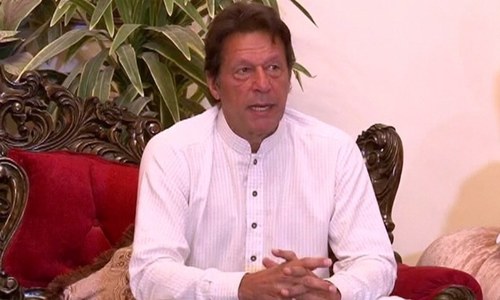ISLAMABAD: Chief Justice of Pakistan (CJP) Mian Saqib Nisar, who is on the last legs of his tenure, said on Thursday that he did not want to carry the stigma of doing injustice to anyone.
No impression should come forth as if judges wanted to settle some scores and victimise or target someone and that they were biased, the CJP observed while heading a three-judge Supreme Court bench.
The bench had taken up a petition of Advocate Feroz Shah Gilani, president of the Lawyers Foundation for Justice, seeking recovery of huge amounts of public money wasted against the backdrop of the National Reconciliation Ordinance (NRO) in 2007 allegedly by former presidents retired Gen Pervez Musharraf and Asif Ali Zardari and former attorney general Malik Mohammad Qayyum.
After the furnishing of affidavits by Mr Musharraf and Mr Zardari about the details of assets and properties owned by them both inside and outside the country, the court seemed not inclined to proceed further. But since the affidavit of Mr Qayyum had not come, the court postponed further proceedings for the first week of November when it will also determine the maintainability and merit of the petition.
Sometimes courts deliver decisions in view of out-of-the-box situations, Justice Nisar observes in NRO case
The chief justice asked senior counsel Farooq H. Naek, who appeared on behalf of Mr Zardari, to convey and explain to his party leaders that judges never took sides and did not have bias against anyone.
At this, Mr Naek explained that Mr Zardari, Bilalwal Bhutto-Zardari and he himself had asked leaders of the Pakistan Peoples Party not to issue any statement to undermine the institution of the judiciary.
“Make this institution strong so that it may become messiah for people one day,” the CJP observed.
Sometimes the court delivered decisions in view of out-of-the-box situations, he observed. But still the court was bound to decide while remaining within the four corners of the law under Article 4 and by providing opportunity of fair trial to everyone under Article 10-A of the Constitution, he added.
Earlier, Advocate Akhtar Shah on behalf of Mr Musharraf furnished a sealed envelope containing medical report of his client. He pleaded before the court not to make it public or read loudly.
But the court observed that the treatment of the disease with which Mr Musharraf was suffering was available in Pakistan where doctors were more experienced than in Dubai.
The counsel, however, argued that Mr Musharraf was ready to return to the country but wanted assurance that he might be allowed to go abroad whenever he wanted treatment of his disease outside the country and that his name should not be placed on the Exit Control List.
The CJP, however, observed that the apex court could not undo declaration of proclaimed offender by the special court hearing a treason case against Mr Musharraf, but could issue a directive that he should not be arrested on arrival, adding that life was most important component.
The court would consider whenever any application on behalf of Mr Musharraf came seeking permission to go abroad for treatment of his disease, he observed.
CJP Nisar asked the counsel to convey to Mr Musharraf that he should come to record his statement under Section 342 CrPC before the special court by Monday.
The counsel, however, contended that his client was facing many cases, including the Lal Masjid case, without any charge sheet.
The CJP observed that the court could issue orders that all courts seized with cases against Mr Musharraf should decide matters without being prejudice and would even allow grant of protective bail to the former president, besides ordering his treatment in Pakistan according to the standard he desired. Otherwise, he said, the law would take its own course.
The counsel, however, explained that Mr Musharraf simply acted rather misguided on the advice of the then prime minister and the cabinet before signing the NRO, but only he was being tried while others had been spared.
The court asked the petitioner to explain what he wanted with his petition and reminded him that the NRO had already been declared illegally by the Supreme Court.
When the petitioner requested the court to order the National Accountability Bureau (NAB) to probe the matter and determine the losses Pakistan had suffered against the backdrop of the NRO, the CJP observed that the court could not ask NAB to start harassing people.
Published in Dawn, October 12th, 2018














































